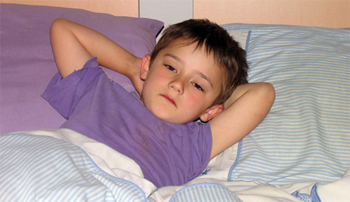Many families like to blame the time change for those irritable mornings and repeated attempts to wake-up the kids.
 |
UNMC’s Brett Kuhn says Springtime presents many challenges that can hinder children in terms of getting adequate sleep. |
“The next two months can be considered a ‘high risk’ period when it comes to sleep deprivation for our children,” said Brett Kuhn, Ph.D., an associate professor of pediatrics and psychology at UNMC and a behavioral sleep medicine specialist at Children’s Hospital & Medical Center. “They are busy with activities and with the nicer weather and extra hour of sunlight in the evening, tend to go to bed later. Yet, they still have to be up at their regular time in the morning for school.”
Chronic sleep deprivation can affect mood and lead to a lack of focus. It can also weaken the immune system. Behavioral problems can become worse.
|
“The large majority of teenagers need a little more than nine hours of sleep per night, but research suggests they are getting much less,” Dr. Kuhn said.
While things like television, video games and computers can interfere with or delay sleep, Dr. Kuhn said that a consistent wake-up time, even on weekends, can be helpful when it comes to managing better sleep routines.
“It is okay to sleep in some on the weekends, but we want to try and maintain a reasonable wake up time,” he said. “This is how we help our bodies adjust to schedule changes and stay in sync.”
Brief naps during the day trump oversleeping as a way to relieve tiredness, he said.